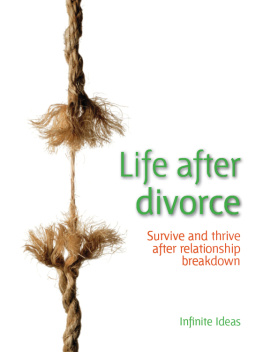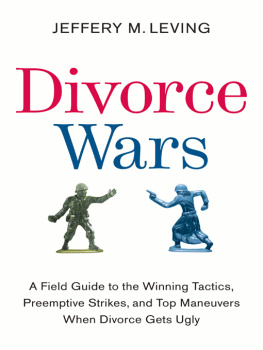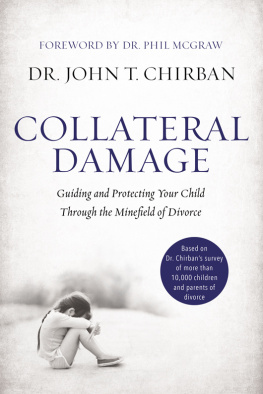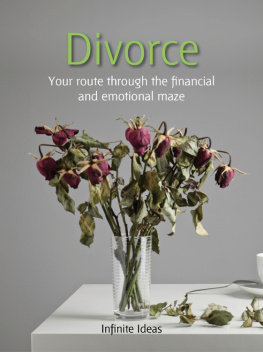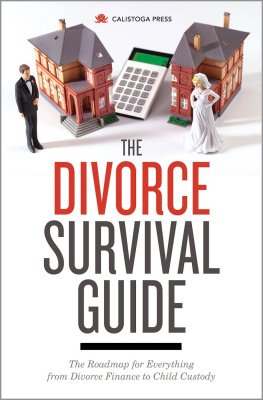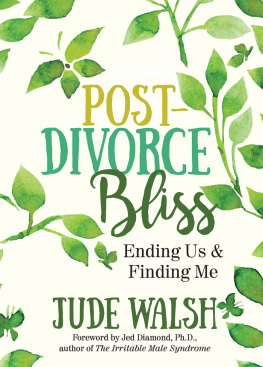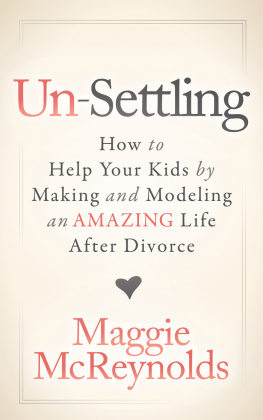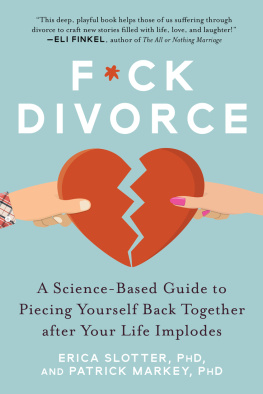Life after divorce
Survive and thrive after relationship breakdown
Infinite Ideas

8. Cutting ties
Ties that bind can be cut even if they cant be unravelled. Rather than dwelling on the past and trying to unknot the history between you, focus on the future.
The ties between a married couple are both practical and emotional. Some are easy to cut and others are far more resistant to the scissors of divorce. Often the best way to cut the emotional bonds between you and your ex is to ensure that all the practical arrangements between you are tied up securely.
Money matters can tie you up in knots for years if not dealt with quickly and efficiently. To avoid this, a good solicitor should be consulted to ensure you get the fairest deal. Once you have reached a settlement, stick to it and tie up the loose ends as quickly as possible. Arrange for all joint accounts to be closed and make certain that you have individual current, savings and pension accounts in place. Your house will be seen as part of your marital assets and considered in any financial settlement. However, even if the marital home has been awarded to you, ask yourself if you really want to stay there. If you are having problems moving on from your marriage, remaining in the home you shared with your ex could be a bad decision.
Custody of your children, visitation and their maintenance will be a key part of your divorce. If your children are having any contact with your ex, there will be an unavoidable tie that remains between you. However, try to see this as positive. Divorced parents can still be good parents and in this case some degree of partnership may be a good thing.
Heres an idea for you
Weekends and evenings can be lonely and you may find your fingers itching to call your ex. But dont scratch! The more contact you have, the harder it will be to move on.
Defining idea
The turning point in the process of growing up is when you discover the core of strength within you that survives all hurt.
MAX WERNER, Writer
9. Telling the children
Spare them stories about Dads extramarital activities with his secretary, but be honest with your nearest and dearest
What on earth are you going to tell the kids? It may be hard, but you are going to have to be upfront, open and very aware of what you are saying. But dont lie. Being upfront with your children will ensure they dont have false hopes. Different age groups respond in different ways, and its important that you dont load them with information they cant handle or patronize them if theyre older.
- 25 year olds find divorce or separation difficult to understand. They might fall back developmentally for a while, have problems with potty training or use babyish language. Tantrums, tears and attention seeking are common, but short lived, reactions.
- 68 year olds are able to begin to understand what divorce or separation means. Many grieve deeply over family breakdown, pining for the parent has left.
- 912 year olds are better able to understand what divorce or separation means. Many feel ashamed, resentful or angry towards one or both parents.
Survival strategies: what you can do
1. Make sure they know its not their fault. Preteens can struggle to understand that you are separating from each other, not them.
2. Speak to school. Teachers notice changes in concentration, friendships and academic achievements, and if they know what is happening at home, they might be more empathetic and less punitive.
3. Sometimes its tempting to overcompensate, showering preteens with presents. But present giving is no substitute for actually telling children that you love them, however embarrassing this may be.
4. Whatever shes done to you, try not to criticise your ex-wife in front of the children. Too often, weve seen kids caught in the crossfire between warring parents.
Heres an idea for you
Children in the throws of family breakdown need consistency more than ever. If you can, you and your ex should each apply family rules with equal sanctions for misdeeds.
Defining idea
I dont feel caught in the middle. I hate them both equally.
NIGEL FULLERTON, 11
10. Dating dilemmas
Met someone you just cant resist? Or maybe youd just like to get out there?. Whatever your situation, you need to know the pros and cons of dating during divorce.
Theoretically, there is no reason why a date before the decree should be as risky as playing barefoot football with a rattlesnake. Lets face it, hundreds of people will date during the divorce process. But if you follow a few simple rules, its easy to make dating before the decree both safe and fun.
- Assess the amount of risk involved and act accordingly. So if your ex-to-be is more savage over the divorce than a starving hyena on a fat wildebeest, then be careful. If youve already got the decree nisi, it is easier to date safely. This is because your divorce petition has been accepted on the grounds you have requested and you are simply waiting for the final decree.
- Question your motives. Why do you want to date? Perhaps youve been separated for a long time and its time to move on. Maybe you just need some laughs and fancy a bit of flattery from the opposite sex after years of being in a marriage that makes The Killing look like a comedy. If thats the case then, great, go ahead and date. But if you want to date solely to make your ex-to-be jealous then its time for a rethink!
- Keep things simple. Date for fun, not to find the next partner of your dreams. So if someones asked you out for a drink, then go out for just that; banish any thoughts that this date could be the one.
And if you are frightened that your dates might jeopardise your divorce, then dont date - wait!
Heres an idea for you
Going on a date? Then make sure youre not a divorce bore. Its a trap that many people fall into and end up wondering why their dates didnt want to see them again.
Defining idea
I usually avoid temptation, unless I cant resist it.
MAE WEST
11. Mediation, not litigation
Youve said all there is to say, and you still cant agree on a settlement. Youre going straight to court, right? Wrong! How about mediation?
Poised halfway along the motorway that runs from counselling to court, mediation is a service station thats being visited frequently as divorces become increasingly complex. Mediation doesnt pretend to be a form of therapy, or a path to reconciliation; it is firmly aimed at couples whose relationship has already broken down irretrievably.
Why might you need mediation? Quite often in the process of divorce we feel that our spouse refuses to listen to our views and dismisses our needs. Reasonable discussions escalate rapidly to thermonuclear arguments, and most of the possessions were arguing over are flung against walls in frustration. Mediation can prevent this from happening, and can also stop your private battles from becoming public news at the local court.
Mediations on the menu
The mediation process allows you as a couple to set the agenda for discussions, and one or sometimes two trained mediators will act as a chairperson and referee. The mediators cant give you legal advice, but they can ensure you get the opportunity to focus on the issues that are important to you. They can help you avoid unnecessary legal confrontation and will also allow you to be heard.
The training of mediators is now regulated in many countries and is a well-regarded service often run in conjunction with court proceedings. Mediation is a great way of taking control of a potentially acrimonious situation. It gives the divorcing couple the power to reach their own agreements and not have to settle for those imposed on them by a judge in court. The couple can leave the marriage feeling that, although it didnt work out, communication was possible and an amicable solution was reached.

